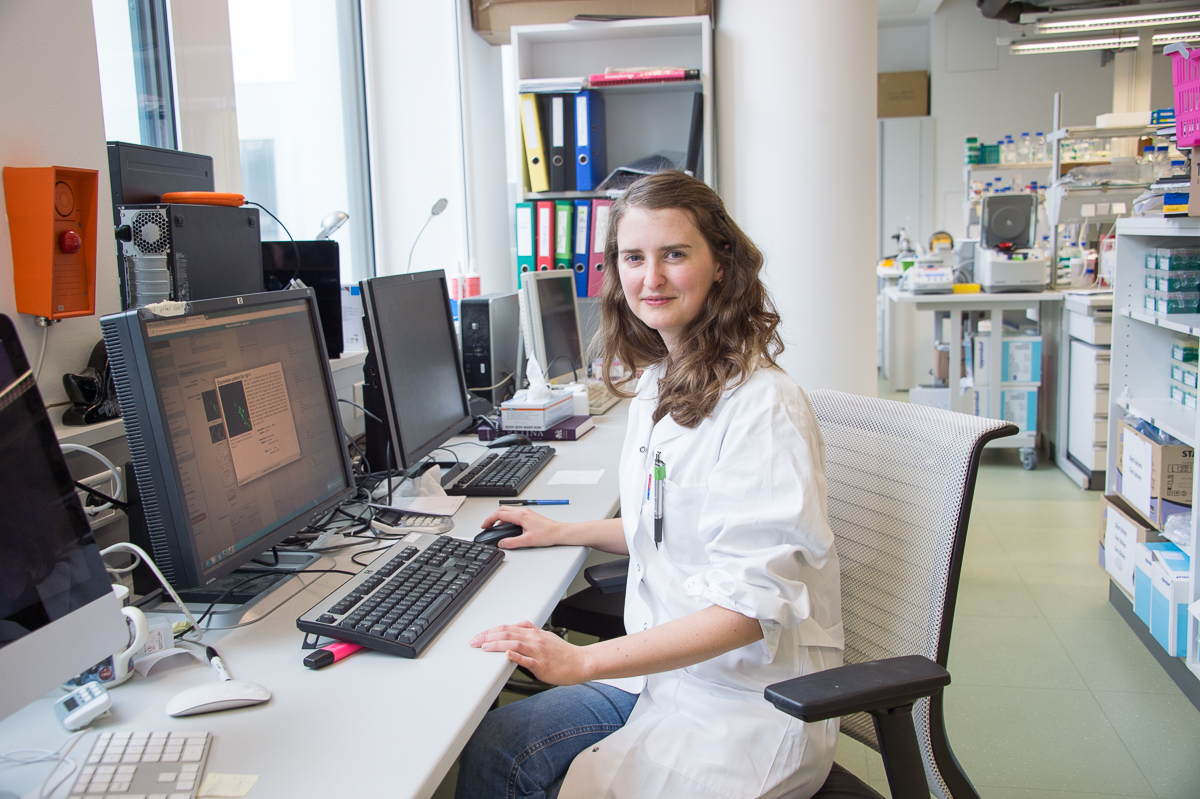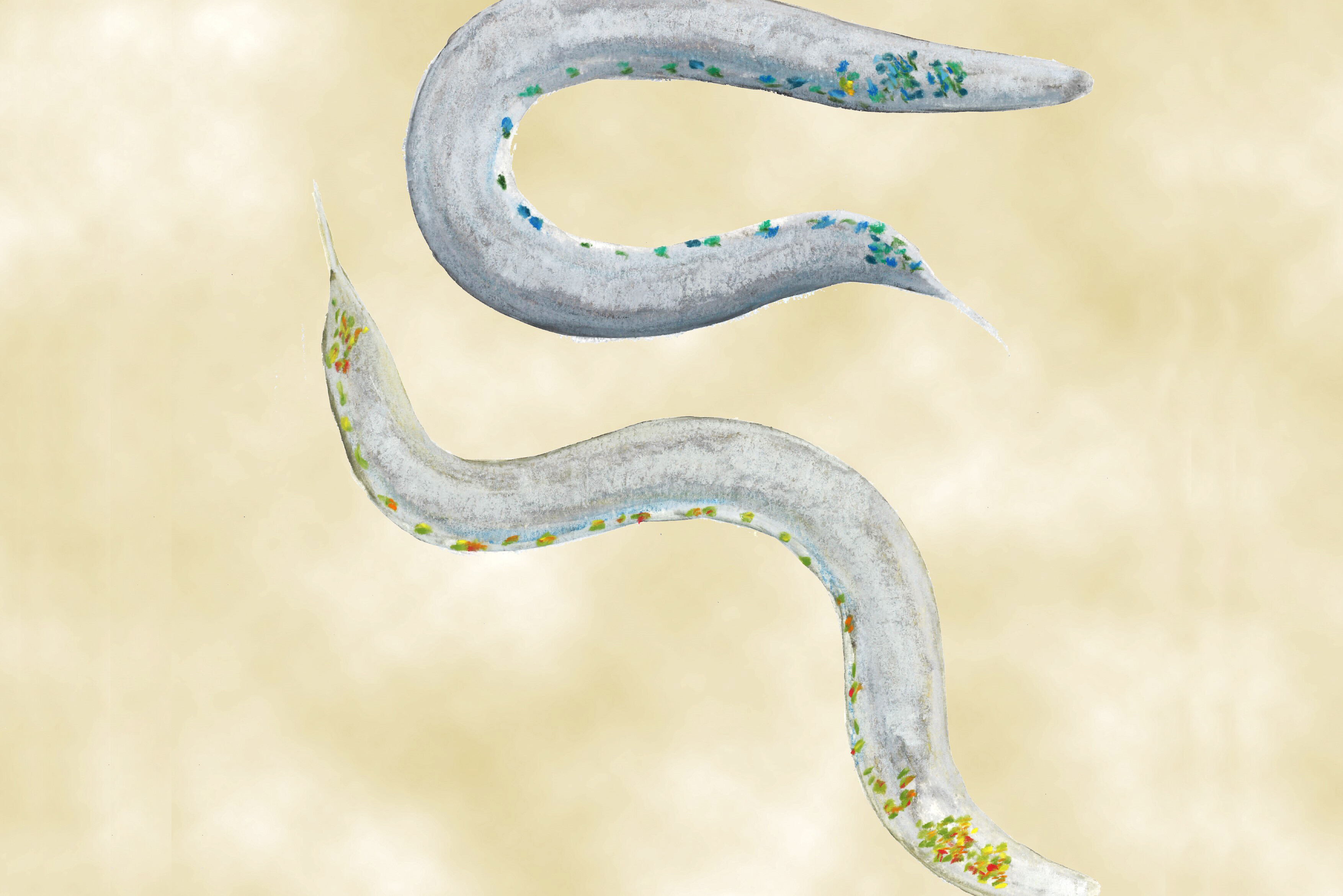Interview Weintraub Laureate Annika Nichols
In 2018, the Fred Hutchinson Cancer Research Center in Seattle announced that Annika Nichols, a VBC PhD Student in the lab of Manuel Zimmer, will be a recipient of the Harold M. Weintraub Graduate Student Award in honour of her “outstanding achievement during graduate studies in the biological sciences.” Out of the more than 260 awardees since the year 2000, Annika was only the fifth laureate from a European institution. “Winning the Weintraub is a golden ticket to a bright future in science”, said Leslie Vosshall, neuroscience professor at the Rockefeller University and IMP scientific advisor upon learning of Annika's award.
Annika Nichols grew up in Tasmania and studied genetics and neuroscience at the University of Queensland in Brisbane and at Uppsala University. As an undergraduate, she worked in the Hilliard Lab at the Queensland Brain Institute to study the molecular mechanisms of axonal degeneration in C. elegans. In 2013, Annika joined the group of Manuel Zimmer at the IMP via the Vienna BioCenter PhD Programme. In our interview, Annika reflects on her experience as a PhD student at the IMP.

Annika, for your Bachelor's degree, you worked with Arabidopsis. When did you first come in contact with C. elegans and neurobiology and what fascinated you?
For my Honours degree - an Australian, research-intensive, post-graduate degree similar to a Masters - I joined the lab of Massimo Hilliard after fortuitously meeting him at a research project fair. I was attracted to the lab by the intelligence and drive of its members. The eventual 2.5 years I spent in Massimo’s lab have had a huge impact on my initial scientific development and I still regard those lab mates as an extended family. In Massimo’s lab I worked on how nerve cells degenerate using the 1mm long nematode worm C. elegans.
The worm - as we C. elegans researchers fondly refer to it - is a wonderful model to work with as it is tractable and quick. Meaning that you can come up with new hypotheses and very quickly test them. I appreciate its sleek biology where its anatomy, especially its nervous system, is so stereotyped and streamlined. However, this apparent simplicity belies the underlying complexity. I find it astonishing that with only 302 nerve cells the worm can do many of the behaviours that we do - move around, find the best food, avoid adverse conditions, and sleep. The question of how the nervous system of C. elegans can switch between wake and sleep became the burning question of my PhD.
During your undergraduate years, you spent a semester in Uppsala. How important is traveling and widening your horizon to you?
One of the things I love about science is that it is borderless. I love that I work with people from different cultural and scientific backgrounds as I believe this can challenge and enrich the way you see the world. Challenging your own beliefs is crucial in good scientific research.
So, how did you come across the Vienna BioCenter PhD Programme and what made you apply to the IMP?
Well, I wanted to do my PhD overseas and settled on Europe as it is scientifically dense compared to the relative isolation of Australian science, and to be closer to my extended family in Sweden. The IMP was suggested to me by my former supervisor Massimo, who had overlapped postdocs in the same lab as my to-be PhD supervisor, Manuel. When asking for what I should look for in a PhD lab, many of my trusted advisors emphasised the importance of the people you will work with. At the VBC PhD interviews I felt like I was already part of the community - thanks to Manuel and members of his group as well as finding like-minded people amongst the other interviewees, many who became firm friends.

You have now successfully published your results and you are about to obtain your PhD. What were the most challenging phases during your doctoral studies?
My PhD has been about learning how to better manage myself: how I think, how I react to stress, how I communicate with people, how I plan my time, and what limits and priorities I set. It’s easy to be overwhelmed, especially at the start when you’re trying to work out how to do so many new things and to live up to your own expectations. It’s hard when you’re at the edge of knowledge and your ignorance is staring at you. To combat these feelings and to learn the skills I needed, I relied on the support of people around me, my friends and family, my colleagues and most of all my supervisor Manuel. Manuel was always excited to see and discuss results and plans, his enthusiasm and wealth of experience were a huge help for me. Some of my highest highs have been in the lab and having people share the excitement of a new idea or result is the most fulfilling part for me. In all, my PhD has been a challenging but immensely rewarding time.
How did the years spent in the Zimmer lab at the IMP influence or shape you as a researcher?
I’ve grown in confidence, competence and direction since I’ve joined the Zimmers. Manuel gave me the space but also the pushes necessary to drive the project and my development to where it needed to go. There’s a great working environment in the lab where thoughts, experience and reagents are shared generously. This is especially evident in our notoriously long lab meetings or practice talks where every detail is thoroughly weighed, discussed and assessed. These feedback sessions provided me with invaluable unseen ideas and details that I could incorporate into my project and talks. While we each have our own independent and compelling projects, I believe that part of this sense of shared achievement comes from Manuel’s strong vision for the lab’s overall direction. I am excited to see where everyone’s project will go, and to see what the lab will be doing in ten years. It’s a privilege to work alongside such intelligent, hardworking and fun people, and I know I’ll carry their positive influences long into my future.
Now you have been selected to receive the prestigious Weintraub Graduate Student Award. What does this distinction mean to you?
I’m extremely honoured to be awarded this prestigious prize. It’s a wonderful recognition of my hard work, but also of the supportive community I’ve had around me. I’m looking forward to sharing my research and discussing with the other awardees and researchers at the Fred Hutch in Seattle.
First published in March 2018.
Further Reading
News Item: Weintraub Award 2018 for Annika Nichols
News Item: How brains surrender to sleep (on Annika's "Science" paper)